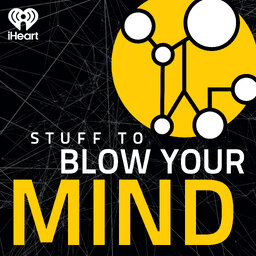From the Vault: Is Santa a god? (parts 1 and 2)
He knows when you are sleeping. He knows when you’re awake. He knows if you’ve been bad or good, but is Santa Claus merely a magical entity or does he rise to the status of a god? In this pair of STBYM episodes, Robert and Joe discuss the general attributes of a deity and consider the awesome, reality-warping powers of the one we call Kris Kringle, Saint Nicholas, Father Christmas and of course Santa Claus. (Originally published 12/19/2019 and 12/24/2019)
Learn more about your ad-choices at https://www.iheartpodcastnetwork.com
In 1 playlist(s)
Stuff To Blow Your Mind
Deep in the back of your mind, you’ve always had the feeling that there’s something strange about re…Social links
Follow podcast
Recent clips

Crab Bag, Part 1: The Crabs are Back In Town
54:40

Weirdhouse Cinema Rewind: The Telephone Box
1:19:53

From the Vault: Mystery Cults, Part 3
1:03:47
 Stuff To Blow Your Mind
Stuff To Blow Your Mind